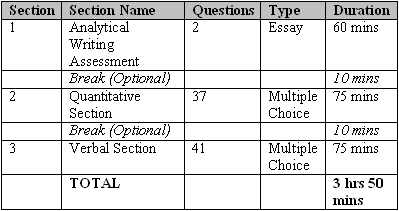Part I: What is the GMAT and how do I apply?
So you've decided you want to apply to a B-school abroad, the next step is to take the Graduate Management Admissions Test or the GMAT, as it's called. But what does the test measure and what format does it follow? Here's what you need to know:
What does it test?
The GMAT is designed to test:
- Quantitative abilities: The aim is to ensure that the applicant possesses the basic quantitative skills to be able to understand various concepts discussed in various courses in a business school.
- Verbal abilities: Students in a business school are expected to have a minimum basic knowledge of the English language. This helps them comprehend various text books, business cases and lectures in the class. A business programme does not leave enough time to spend on improving your verbal skills.
- Analytical abilities: A candidate appearing for the test needs to have decent analytical abilities since some questions cannot be answered if this quality is lacking.
The format
The following table describes the test in a condensed manner.

GMAT scores
Once you have completed your test at the centre you will get a print of a score report which is called your "unofficial GMAT score report" or "test centre score report". This will contain the scores obtained by you in the quantitative section, the verbal section and the total score. Scores for your analytical writing assessment are not included in this report. Each section and the total score are reported in two formats: the 'raw score' and the 'percentile score'.
~ Raw ccore: This is your absolute score that was obtained in the section. The maximum score that can be obtained is 60. This score is obtained by scoring the number of questions answered correctly and the level of difficulty of questions answered. According to GMAC, scores above 44 in the verbal section and above 50 in the quantitative section are very rare. The total raw score is reported out of 800.
~ Percentile score: The percentile score tells you what percentage of candidates who have appeared for the GMAT till date scored below you. For example, if the verbal raw score is 27 and the percentile score is 50 it means that 50 per cent of all GMAT test takers have got raw score of below 27.
Reporting your test scores
The schools that accept the GMAT scores require GMAC to send the "official GMAT score report" to the school. There are two ways to send this official report to the schools that you wish to apply to.
1. On the test day: On the day of the test you will asked to choose up to five schools that you wish to report your scores to. The fee for sending these scores to these five schools is included in the GMAT fee. If you do not choose to send any scores at this point you will not be allowed to send these score reports free of charge later.
2. After the test date: You may request for additional reports to be sent to schools through the GMAT website at www.mba.com. Please note that there is an additional charge of US$ 28 for each additional report requested.
The official GMAT score will contain all the scores you obtained in your unofficial score report and also your AWA scores. The raw AWA scores are reported out of 6 and the percentile score is also generated.
Please note that your test centre score and your official scores will have the same raw score report but may carry a different percentile score. This is due to the very nature of the percentile score. For example, if people who have taken the GMAT after you all scored better than you did then with the same raw score you will get a lower percentile rank. This should not be a cause of concern as the difference is usually not more than one percentile.
Retaking the test
You are allowed to retake the test but there must be a gap of one month, 31 days to be exact, between your previous test date and your next appointment. It is therefore wise to take this test as early as possible. If you take the test close to the application deadline of a school and you feel that you could get better scores if you take the GMAT again, you will miss the application deadline that year.
Validity
The GMAT scores are valid for a period of five years. Hence, one should plan for her/ his education well in advance, prepare for the GMAT and take the test well before the application deadlines.
Part I: What is the GMAT and how do I apply?
The author is the Director - Office of Admissions and Financial Aid, Indian School of Business, Hyderabad, India.







